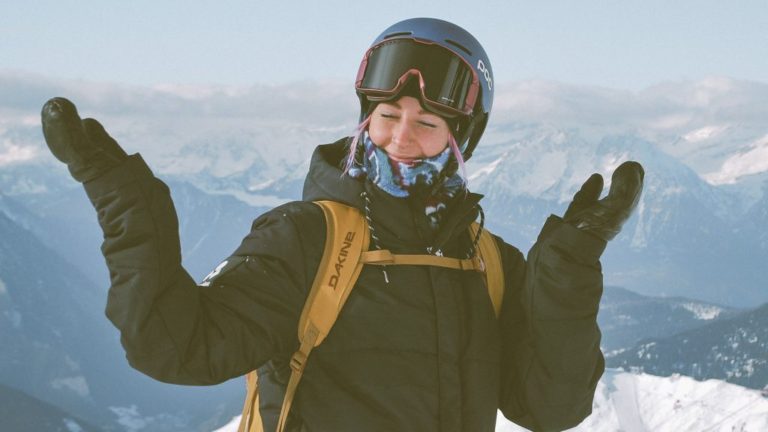
She’s one of the British trio of siblings making headlines in freestyle skiing ahead of Beijing 2022 – and she’s also helping to provide representation in sports for people who are pan. We caught up with Makayla for an exclusive Q&A about the bump and roll of moguls and being a role model…
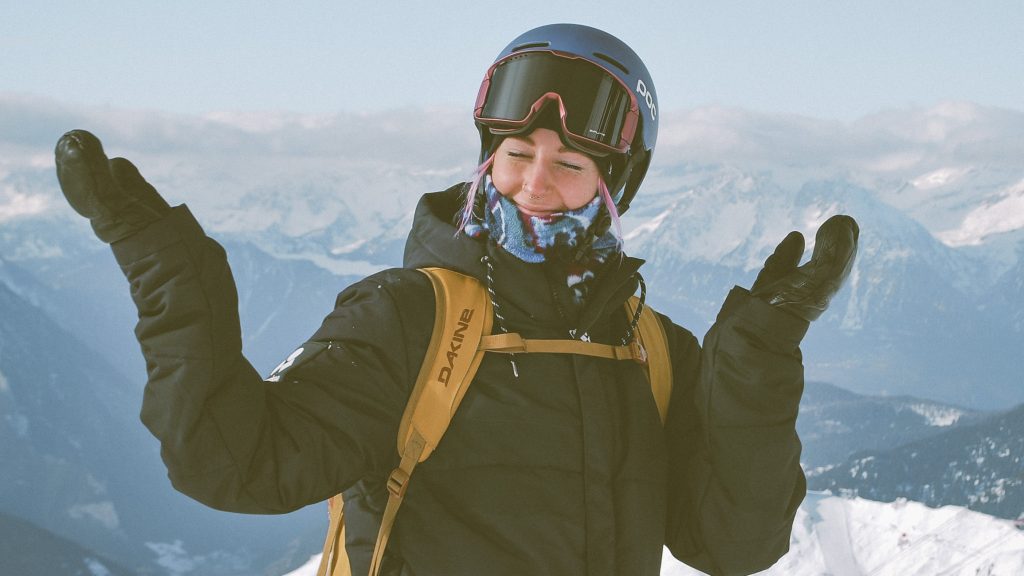
Speeding down the slopes in style, backflipping through the air, and always with a smile – mogul skier Makayla Gerken-Schofield is a rising British sports star who carries with her a refreshing message of fun and freedom.
She competed in her first Freestyle Ski and Snowboarding World Championships in 2017 when she was still just 17. This year’s moguls events, held in Kazakhstan in March, saw her make the last 16 in dual moguls and she also qualified for the singles final round as one of the best 18 competitors in the world.
Makayla’s elder siblings – twins Tom and Leonie – are also Great Britain internationals in moguls and all three are aiming to qualify for the next Winter Olympics, to be held in Beijing in February 2022.
Sports Media LGBT+ first connected with Makayla through Instagram a few months back and in February, she helped her sport’s governing body GB Snowsport to mark LGBT+ History Month.
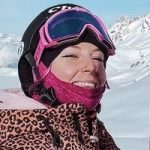
The 21-year-old explained that she was proud to be LGBTQ+ herself and had come out relatively recently, adding: “Many people call me bisexual but I consider myself as pansexual… I would be delighted to meet more people in the LGBTQ+ community in snowsports and to bring my support for someone who would need it.”
With Monday, May 24, being Pansexual Visibility Day, we reached out to Makayla and she generously found time for a chat with us! As racing driver Charlie Martin told us in our Q&A for PVD in 2020, “having more pan role models will mean more awareness” – and we’re very grateful to Makayla for helping out with that in sports.
Read on to discover Makayla’s happiest career moment so far, why visibility is important to her, navigating Instagram, what she watches on Netflix, and much more…
JH: Hi Makayla! Tell us about being a moguls skier – how did you get into the sport?
MG-S: I followed in my brother and sister’s footsteps. Our family used to go on holiday every year to Val Thorens in south-east France, and eventually our parents bought a house north of the resort in Châtel and we moved there when I was six.
All three of us kids got into skiing seriously – our dad’s very sporty. We had a teacher who said we were more freestyle than alpine, and that it’d be great if we became part of the local freestyle club. Tom and Leonie joined before me because I was a bit scared, but I did start with the club when I was 10. I haven’t looked back since! Now I’m competing for Great Britain. I never thought I’d get to this stage – it’s been a hell of a journey so far!
Not many people know about the sport – every time you say to someone ‘I’m a skier’, they assume it’s alpine. When you say moguls, they tend to get excited but also confused because they don’t know what it is exactly.
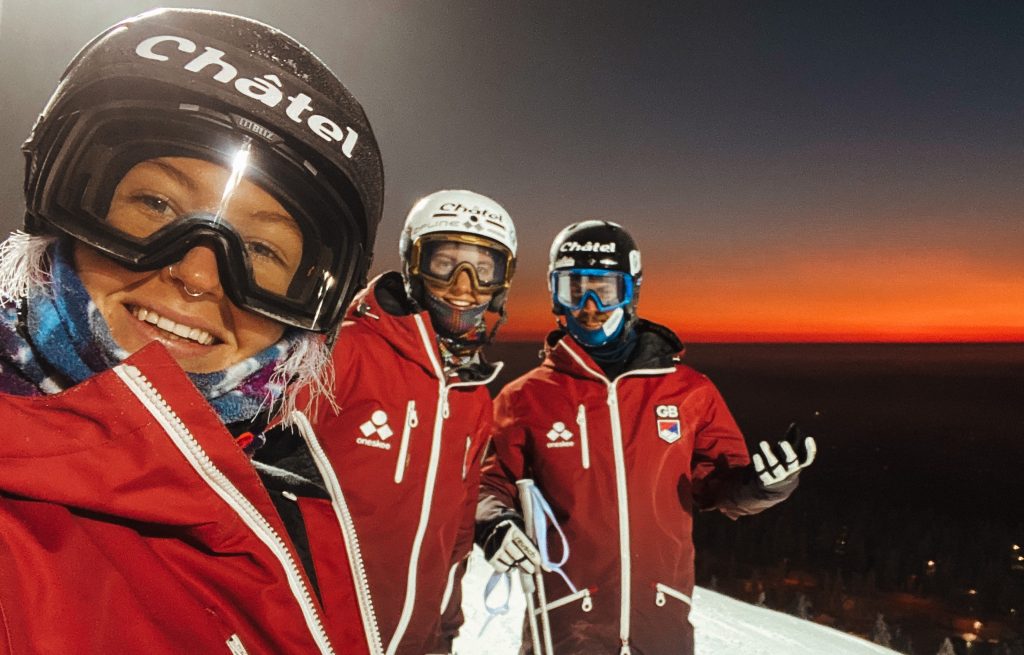
So it’s a steep downhill course, very technical, and with those aerial manoeuvres to perform as well. You mentioned that when you were younger, it looked too scary…
Yeah, the aerials are still a bit terrifying at some points! For training, we do trampolining to learn tricks; then you move on to going down a ramp and landing in the water; then you put it onto the snow, starting off on softer or ‘powder’ days.
I remember times when I was a kid and I’d just cry because I was so scared of doing it, such as trying my first backflip. But now, I love landing the tricks and the feeling it gives me, because I’ve conquered that fear.
Did it help having Tom and Leonie doing it too, spurring you on?
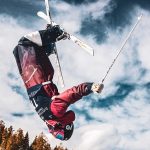
It’s a very competitive sport and we’re very competitive siblings! For men, the difficulty is higher, but the women are getting there and it’s amazing to see more and more girls landing higher difficulty tricks. I really want to get there too.
It does push me, having my brother and sister doing the sport too – we give each other tips, and generally support each other.
What’s been your biggest achievement to date?
Results wise, I came sixth this season in a World Cup event in Deer Valley, Utah. That was duals, where you compete head to head against an opponent.
But weirdly perhaps, I do feel my biggest achievement was watching Tom get on the podium in Krasnoyarsk in Russia – he took silver in duals, and it was the first medal in World Cup history for a British moguls skier.
It was so emotional, and my sister and I were in tears. I’d not had a good day myself, but Leonie had done brilliantly – and then Tom got silver! It just made me feel so much better. When they do well, it makes me really happy.
And what’s the next big target for you?
At the moment, I’m in Manchester learning new, more difficult tricks. I’m really excited to try to put them on snow this season.
But really, I’m just having a good time skiing and having fun – being able to travel the world doing what I love is absolutely incredible and even more so with my siblings by my side.
How are those Olympic ambitions looking, with nine months to go until Beijing 2022?
We’re more into focusing on qualifying first of all, even if it’s just one or two of us – it would be a dream if it does come to all three of us qualifying for the Olympics. I’d have to pinch myself to know if it’s real or not. We’ll see what goes from there.
How has the pandemic affected you all?

It was a very weird season. We had only five or six competitions instead of 15 and you never really knew if you were going or not. You just had to be on your toes – you’d be at home thinking, ‘what do we do?’
We worked out as much as we could and took it day by day, but it was hard not being able to plan things out. Yeah, it’s been a messy year.
GB Snowsport invited me to write a blog for their website last year, and I was really pleased to see your article on there too in February. How do you feel the sport in the UK is getting on with regards to LGBT+ inclusion? I guess Gus Kenworthy coming on board has helped?
I never really looked into it before, as I never really spoke up about being pan within GB Snowsport. I think through me posting pictures with my girlfriend Oriane on social media, they came to me about doing an article for LGBT+ History Month which then came to having more open conversations with my family about being pan, as I never really came out to them, and getting positive feedback from people on social media which made me quite teary.
Coming back to LGBTQ+ inclusion in sport in the UK, I think it’s getting there, if that makes sense. People are becoming more aware of why we need to be visible and that people within the LGBTQ+ community need to feel safe in their sport and accepted. Gus coming on board has also made people more aware of how big of an impact it can be for an athlete to come out to the world.
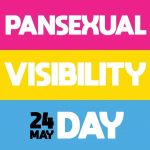
Here we are now at Pansexual Visibility Day, which always seems to me to be a particularly useful awareness day. Do you feel the same way?
I feel that any LGBTQ+ visibility day is useful awareness! To be able to stand up, be accepted, and be understood that being pansexual is just one part of who someone is. On Pan Visibility Day, it’s important to remember that we’re celebrating pansexual people from all backgrounds and all walks of life.
Tom, Leonie and friends saw that I kissed a girl at a party, so they sort of guessed I was ‘bisexual’ so I just went with it and assumed I was bi. But then it bothered me because it didn’t feel like that was me… pansexuality is different from bisexuality but the two aren’t mutually exclusive. Being bi means being attracted to more than one gender, while being pan means being attracted to people regardless of gender.
And it’s nothing to do with saucepans or frying pans! I have nothing against old jokes but the one about being sexually attracted to pans isn’t just old, it’s also just not funny…
Watching LGBTQ+ documentaries, movies, or even just looking up the different kinds of sexualities there are in the world helped me. Then I came across pansexual, and it just felt right. I swear I was smiling at my laptop because I finally knew what I was!
Since I’ve found my place in the community, my confidence has improved a lot. I never really knew who I was before – I felt a bit lost – but now, I’m just me.
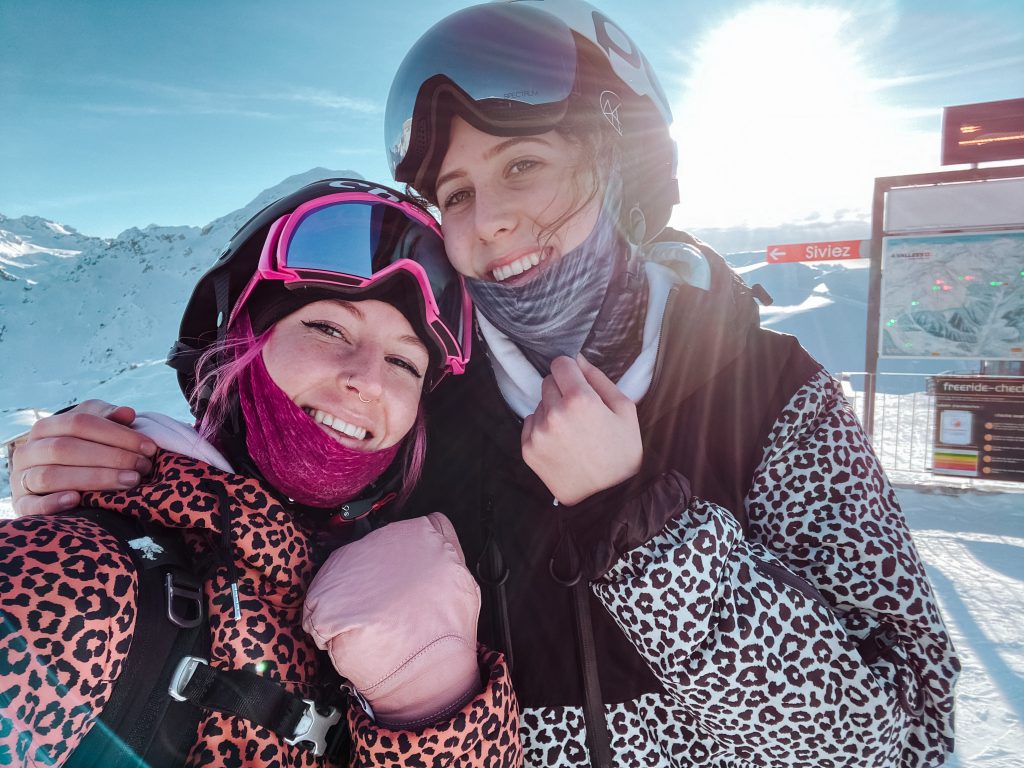
We connected on Instagram which is a place where you seem able to really embrace that part of who you are….
Yeah, I think it’s important to share certain things on social media, so that people are more aware. Even if they don’t understand, they can always send me a message and say, ‘I’m quite confused about this, what does this mean?’ Then I can explain – I love it when people are willing to have an open conversation about the LGBTQ+ community.
It’s funny looking back because I was so nervous to post a picture of me with my girlfriend for the first time. It was a big deal for me because I’d never really opened myself up like that before on social. You always act in a way that you’re ‘this’ person but it wasn’t really me. Now I feel like I’m letting people know who I actually am.
Was that partly due to being an athlete or being in a sport that doesn’t have a lot of LGBTQ+ representation?
As my mum would say, when we’re upset or we’re not being ourselves, we have a cloud over our head. I felt like it was constantly that or that I was being careful of what I would say. Now, I feel I can put myself out there to be that kind of role model, for any others who are actually struggling with their sexuality or finding out who they are.
It’s either helping them or it helps myself, in a way. I hope it can for someone else in moguls, freestyle, or other sports who follows me, that they can feel comfortable to come and speak to me – whether that’s face to face, or via a friendly message.
You’ll turn 22 in early June, which is going to be your first Pride Month being out. How do you feel about that?
Like I can be proud of who I am – like I belong and can express myself a lot more. I’d love to be able to march at a Pride parade one day!
What some people still don’t realise is that if a child comes from a family that doesn’t accept LGBTQ+ people, it can be really hard for them. It can get very abusive, mentally and physically – some children, teens, or even adults get kicked out of their own homes, or even take their own lives. It gives me such a heavy heart and makes me so angry knowing that people around the world are going through this in such a hard way.
I’m fortunate that my family has always accepted me and I’ve never really had any issues. But it’s heartbreaking knowing what happens in certain countries, where there’s a fear of saying who you are and that you could be hurt because of that.
What have you learned in the last year or so?
I’ve learned a lot about what’s not right in the world. I never really knew the problems within the global LGBTQ+ community. It’s really upsetting. Even now in some areas where I’m with Oriane, you feel like you have to be cautious and can’t act a certain way. You always get looks wherever you are, but in the back of my mind, I’ll think, ‘is this person going to be aggressive?’ or even, ‘could we get hit?’ That can be quite stressful.
I try to teach myself by searching ‘LGBTQ+’ on Netflix sometimes – some movies and shows are rather stereotypical and I’m not a fan of those, but many of them do help, particularly documentaries like A Secret Life and The Death and Life of Marsha P. Johnson.
I enjoy watching RuPaul’s Drag Race – I made my dad watch it and it was so funny, because he just didn’t get it! But I love it. I find the whole drag world incredibly talented, from the outfits to the make-up – it’s stunning and so extra.
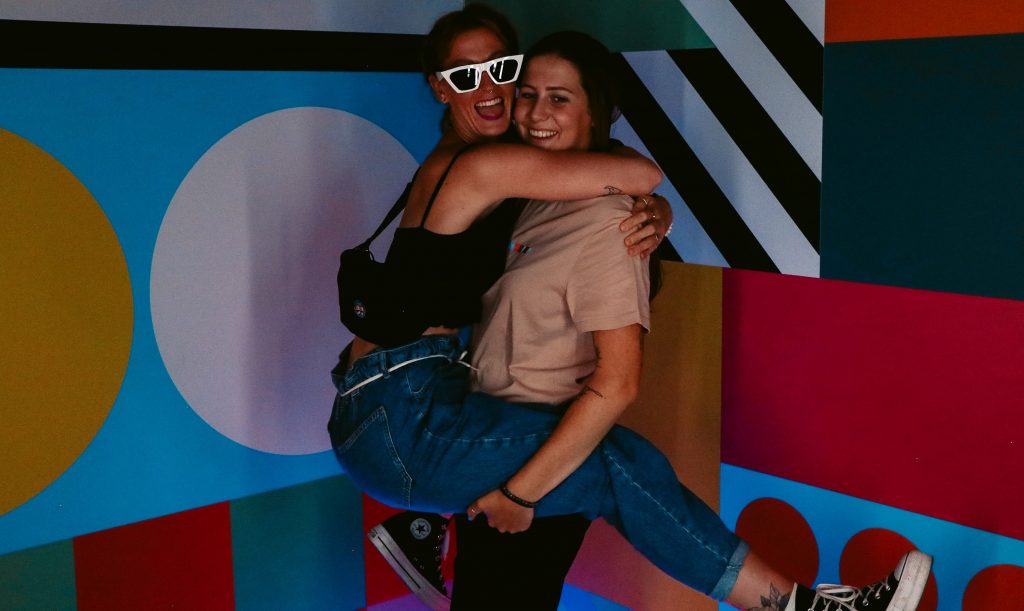
In our Q&A with Charlie Martin for Pan Visibility Day last year, she spoke of the need for more pan role models in sport…
I feel like I’m growing into that and it does help to give me confidence. I didn’t really have a role model or anything like that growing up. If I put myself out there, will it help someone else? If they come across my profile or in public and they see me with my girlfriend, it will probably click in someone’s head and they’ll say, ‘you know what, why can’t I take that step?’ It’s just about helping them to get to that step of finding out who they are.

On the men’s side of the sport, Gus has been able to do that through sharing his story. Is he someone who inspires you?
He does, because what he did took guts and I’m really happy that he can feel that freedom of being himself.
In his recent interview with BBC Sport, he said he was once getting death threats… reading that, I got emotional because I know what it’s like to want to take your own life. You actually never really know what’s happening in other people’s lives until they decide to speak up about it.
It makes me so angry because I can’t understand what’s going through someone’s mind who doesn’t accept someone else being LGBTQ+. It’s not the end of the world, it’s just who they are. If you don’t accept it, take it step by step, learn more about it, and allow yourself to be open to having a conversation about these things.
You travel around the world a lot for your sport, including sometimes to countries where LGBTQ+ people feel unsafe because they have very few rights or even none at all. How do you approach that?
Coming out, I was afraid that in the sport I’m in, people wouldn’t accept me. I was afraid of getting harassed. It’s stressful for me at times in certain places that have few rights or none at all. I catch myself thinking, ‘I probably shouldn’t wear this’ if something has a rainbow on it, or there’s just the typical stereotype – which I hate – that gays look a certain way and they will know that I’m ‘within the LGBTQ+ community’ and then a whole scenario kicks in. I end up having panic attacks thinking I’ll end up getting beaten up or in prison.
It makes me stressed because I don’t know how people are going to react. But I always try to think of the positive things. What if I can do or say something that helps someone else? Anything really that’ll just be visible to others that aren’t out or who are hiding in some way, pretending to be someone that they’re not. I just want to be there for others who need it.
Finally, what’s your message for Pan Visibility Day?

I do think that the visibility days are useful for anyone who doesn’t know what it’s about – in this instance, what it means to be pan. For me, it’s about embracing myself and also getting to know other pansexual people who put themselves out there, and celebrating with them.
I don’t personally know anyone else yet who is pansexual and out so I’ll be looking at the hashtags and going through the posts! I bet there are loads of us in the world. So if you’re reading this, I’d encourage you to embrace and love yourself for who you really are.
A big thank you from us to Makayla! Follow her on Instagram at @kayla_gsch and keep track of the Gerken Schofields’ adventures on Twitter at @gs_ski, on Instagram at @team_gs_, and on Facebook.
Sports Media LGBT+ is a network, advocacy, and consultancy group that is helping to build a community of LGBT+ people and allies in sport. We’re also a digital publisher. Learn more about us here.
LGBT+ in sports? Your visibility will inspire other people – sharing your story can be hugely rewarding and you don’t have to be famous to make a positive and lasting impact. We encourage you to start a conversation with us, in confidence, and we’ll provide the best advice on navigating the media as part of your journey so that you retain control of your own narrative.
Email jon@sportsmedialgbt.com or send a message anonymously on our Curious Cat.